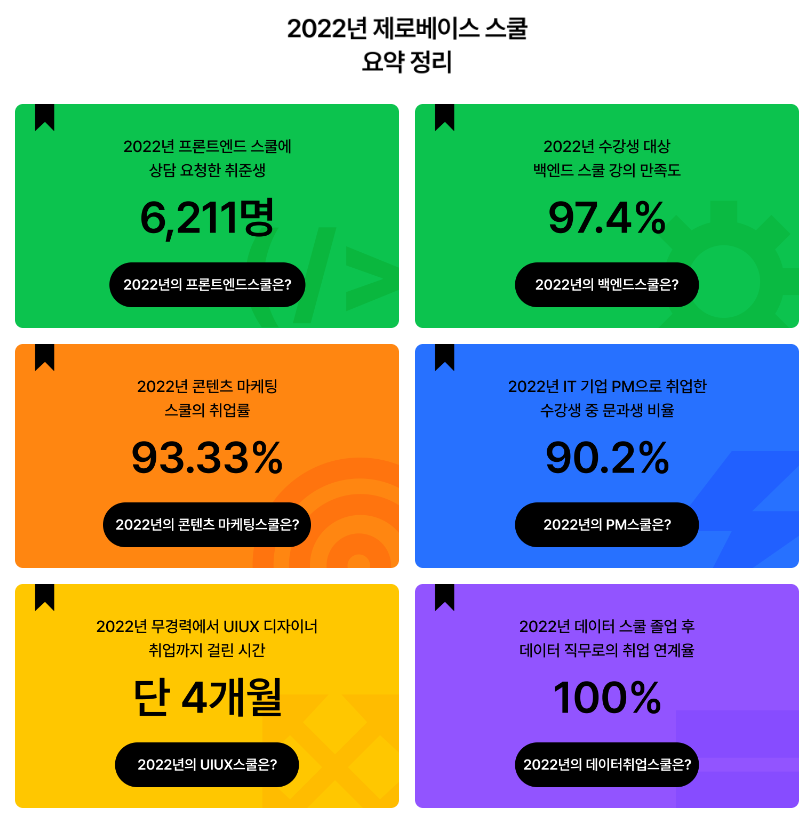The Era of Free Job Training: Why Are Paid Programs Thriving?

Job seekers lament the difficulty of finding employment, while companies complain about the shortage of skilled candidates. The problem? There’s a glaring gap between the “job skills” companies want and the “abilities” job seekers possess. To bridge this mismatch, the government funds both job training institutions and job seekers. It’s why we often see ads for job bootcamps claiming, “Tuition-free! Become a developer in just six months, even without prior experience!”
With government funding amounting to 1.5 trillion won annually, participants can learn essential job skills at no cost, and bootcamp providers enjoy steady revenue. In many cases, the government subsidies awarded through these programs are larger than what providers could earn through direct tuition. As a result, most job bootcamps operate through government-backed programs.
Yet, ZeroBase bucks this trend, insisting on offering only fully paid job bootcamps. At first glance, this seems like a business strategy that doesn’t add up. Why make such a choice?
We spoke with Ji-hoon Kim, CEO of Snowball CIC, which operates ZeroBase, to find out.

A Classic Case of Missing the Point
In an ideal world, government-funded job training programs would create a win-win-win situation—for the state, the institutions, and the students. However, to secure government funding, training institutions must meet specific criteria, and that’s where the problem begins. Instead of focusing on the main goal—helping students find jobs—institutions often allocate more resources to meeting the selection criteria for these programs. (While employment rates are considered in the selection process, they’re just one factor, and the bar isn’t set particularly high.)
“For example, one of the selection requirements is having a system in place to review course content. If you provide the exam through Google Docs, it doesn’t meet the criteria. But is that really the most important thing? Shouldn’t the priority be offering education that leads to better employment outcomes, regardless of the tools used?”
ZeroBase chose to focus solely on the core purpose of job training. Instead of competing to secure government contracts, they set their sights on just one thing: getting their students hired. The effectiveness of the service—whether students ultimately find employment—comes first. For job seekers, there’s nothing more important than landing a job.
This is the primary reason ZeroBase doesn’t participate in government programs.
You Dig the Best Well When You’re Thirsty
Because ZeroBase operates on student-paid tuition, the service only survives if job seekers choose it. To succeed, they have just one challenge to conquer: getting students hired. The higher the employment rate, the more job seekers will flock to ZeroBase. This structure means the company is constantly driven to analyze the job market, continually improve its curriculum, and relentlessly chase results.
“If we had the cushion of government subsidies, we could operate more comfortably, sure. But we chose to burn the boats. We believe that when we’re fighting for survival, our service will stay sharp and focused on solving our customers’ problems.”
Paid education also ignites a sense of urgency in students. They’ve invested their own money and time into ZeroBase, so they expect results—namely, competitive skills for the job market. This drives students to be more engaged, to demand more, and to give pointed feedback. And it’s that tough feedback that spurs ZeroBase to evolve, continually improving the students’ skills.
The connection between paid tuition and student success has been clear throughout ZeroBase’s operational experience. In bootcamps where students pay upfront, completion rates soar to an average of 80%. Meanwhile, in programs where students only pay after completing the course (with no fee if they drop out), completion rates languish at around 20%.
In the end, paid education not only enhances the competitiveness of the students but also strengthens ZeroBase’s position in the job training market. Both parties’ goals are more likely to be achieved this way.
Challenges, Commitment, and Payoff
Despite going against the grain, ZeroBase’s results in 2022 were nothing short of impressive. The data program achieved a 100% employment rate for its graduates. Students with no background or experience in design landed jobs as UI/UX designers after just four months of training. The satisfaction rate for the Backend School hit 97.4%, and enrollment in the Frontend School grew 15-fold compared to the previous year.

These days, new employment updates pour in from ZeroBase’s programs every week, with 20 to 30 students landing jobs each time. In some programs, new graduates have been securing positions for 16 consecutive weeks. Interestingly, many students who had first completed a government-funded job training course later turned to ZeroBase, citing the clear difference in content quality.
“If government-funded job bootcamps truly maintained top-tier content, ZeroBase would’ve gone under a long time ago. Sure, there have been tough moments, but lately, our transaction volumes are steadily rising. The fact that students are willing to pay for our courses, despite the abundance of free alternatives, is proof that our content is worth every penny.”
Choosing Focus Over Quick Wins
Some job bootcamps focus on selecting only the top candidates, carefully screening applicants to ensure the best outcomes. ZeroBase once operated a program called “Connect to” (previously branded as “We’re Getting You into NeCafRacube” in reference to major Korean tech companies) that followed a similar approach.
“Sure, when you handpick motivated students, the results are great. But at some point, I thought, ‘Why are we doing this? These motivated individuals would probably succeed without us. Shouldn’t we focus on solving problems that only we can solve? If we do that, people will have more reasons to choose us.’ That’s why we stopped the Connect to program.”
Once again, ZeroBase chose to forgo an immediate, sweet victory for the sake of a greater purpose. The company decided to focus on the job market’s most pressing problem: providing training that helps individuals with no prior experience or aptitude succeed in securing employment. The goal wasn’t to help the already gifted succeed, but to offer life-changing education for those who truly need it.
Just as they’ve rejected the stability of government-funded programs, and stopped selecting only top candidates for guaranteed success, ZeroBase won’t be taking the easy road anytime soon. Instead, they’ll continue honing their expertise in creating the most job-specific educational content in a constantly changing market. They won’t settle for what they’ve achieved today or rest on their laurels, but they remain confident: if they continue tackling the challenges no one else dares to face, more and more people will turn to ZeroBase.
✍️Key Insights from Today’s Article:
- Sometimes, short-term profits push businesses to deprioritize their ultimate goals. It’s important to think carefully about which choices will deliver the highest long-term value.
- Free services can reduce the burden for both customers and providers but may undermine the quality and competitiveness of the offering.
- By creating a unique value proposition that competitors can’t replicate—even at the cost of short-term losses—a business can survive in even the most competitive markets.